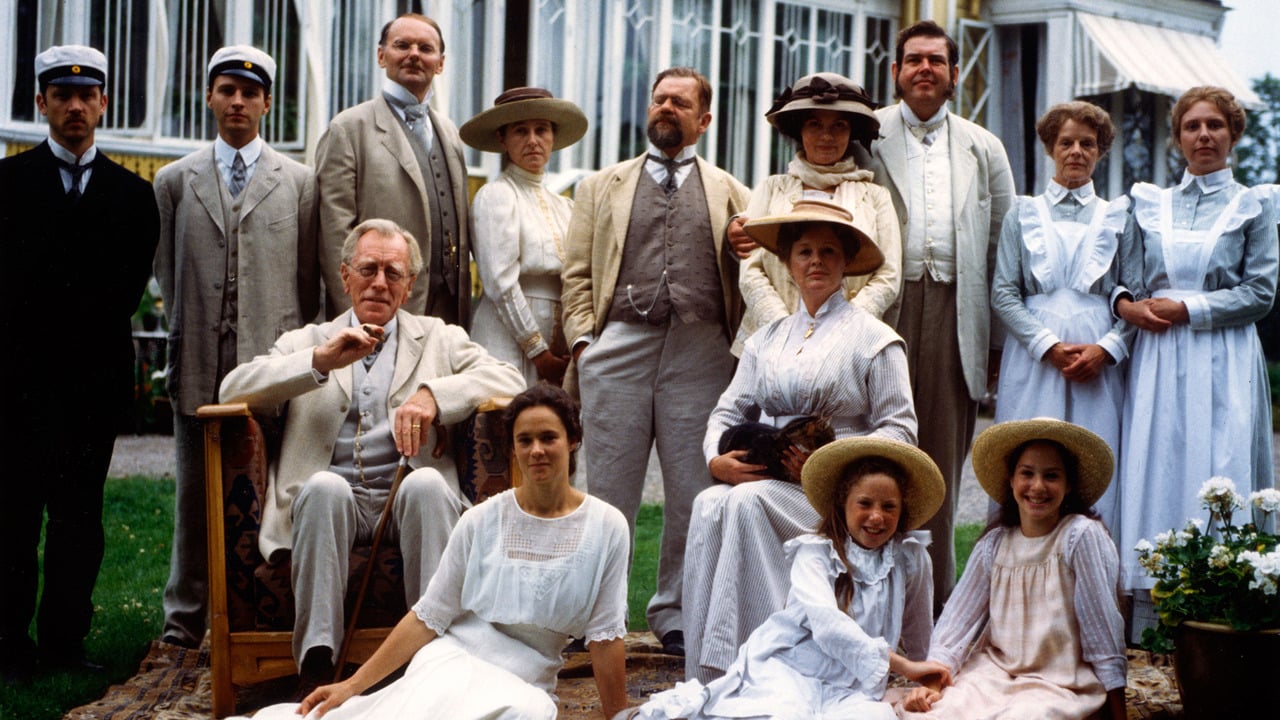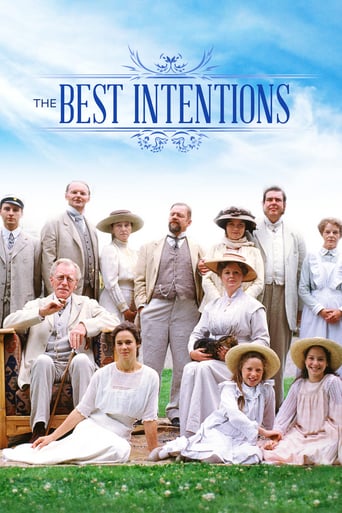

Wonderful character development!
... View MoreWhat a waste of my time!!!
... View MoreI am only giving this movie a 1 for the great cast, though I can't imagine what any of them were thinking. This movie was horrible
... View MoreOne of the worst ways to make a cult movie is to set out to make a cult movie.
... View MoreThe winner of the Palme d'Or in 1992, The Best Intentions gave Danish director Bille August his second win of the highest award of the most prestigious film festival in the world, for a film Ingmar Bergman had written. Bergman himself never won the award and didn't direct The Best Intentions, even though he was still directing two decades after his fictional retirement with Fanny and Alexander (1982). If most people in English-speaking countries have never heard of The Best Intentions, there may be a reason- the vast majority would find a three-hour, subtitled unhappy marriage drama unappealing and boring. To some, however, there is a lot to recommend here.The film touches on issues of faith, the role of church in a changing society, a deteriorating marriage- many topics of which appear throughout Bergman's filmography. A priest struggles on the outskirts of the world in a small community, believing he might do some good, but his wife is deeply unhappy. There are some conflicts with locals who do not like him, including for renting out the church for socialist meetings. Henrik himself is no saint, not particularly deep, sometimes violent against his wife- aspects we see of him as the fictionalized Edvard in Fanny and Alexander. But here we see him suffer a lot more, and it inspires sympathy. Edvard also suffers and I felt sympathy for him too, but Fanny and Alexander is not his film. In a way, The Best Intentions feels like both Ingmar's criticism and reconciliation with his deeply flawed parents.The Petrus subplot also inspires sympathy and shock- the running to the stream scene is by far the most intense part of the film. It's definitely worth a mention, even if it makes a small part of the running time.
... View MoreIt's always kind of staggering to think of other films that deal with love and marriage and the twisted ties that bind when compared to what Ingmar Bergman does in his scripts. Stripped away from the problems that come with such dangerous clichés like the old mother forbidding her daughter from being together with a man she just does not like, or with the marriage being strained by outside influences. Maybe the latter isn't much of a cliché as it might be a convention, but it's all dealt with by Bergman in his story of Henrik Bergman and Anna Bergman with complete, un-filtered honesty, even in the harsher moments. While it's not actually one of his very best scripts, with a couple of flaws here and there and it not being quite long enough (i.e. Scenes From a Marriage and Fanny & Alexander being five hours each), it has more emotionally shattering moments, and even under-stated ones, that would make most other dramas about a relationship in trouble meek in comparison.That being said, it's also not technically a Bergman film, but directed through Billie August with maybe a slightly differed sensibility. Yet it's not by that much, aside from specific choices in the music (I don't think Bergman would have used the musical accompaniment, not that it's bad but it tells of what is usually different and less frequent for the material), and because of the nature of the material and the characters, it's not surprising if the Best Intentions feels more like a Bergman film than August. The rhythm of the acting, too, feels like it still is out of those vintage masterpieces of the 60s and 70s. Here we're given the story of how Henrik (Samuel Froler) and Anna (Pernilla August) came to be husband and wife. It's basically in two halves- the first dealing with Karin Akerblom (Ghita Nørby), Anna's mother, and her dire attempts to keep the two away from one another. And at first Anna agrees, but soon the attachment to one another can't be broken, even through an early affair Henrik has with a waitress and Anna's tuberculosis scare. Many specific scenes, like a very harsh (though always under the surface) scene between Karin and Henrik, when she tells him point blank to leave and never come back to see Anna, or when Anna is told after the death of her father Johan (Max Von Sydow, always great to see him even in limited time) about how she destroyed a letter she found that she meant to sent to Henrik. So much of this is so powerful for how all of the dialog, all of the little notes and emotion in the action penetrate to the core elements of the drama. Sometimes I felt like I was seeing even deeper truths being reached about parents and children (not only Anna with her mother but Henrik with his family- both have tarnished relationships, but however much forgiveness is left off or ties severed shows also how the children become as they are), and a take on the free will vs. determinism of such a decision. So all of this is always fascinating, seeing this 'version' of Bergman's parents and their struggles to be together- Henrik the sort of cold yet compassionate loner parish/priest, and Anna the very warm and heartfelt soon-to-be-mother- as they both have head-strong tendencies. I can't say how much of what unfolds in the 2nd act holds up as being totally true to what Bergman's parents lives were, but then who could? It's all made for dramatic sake, anyway, but what ends up sticking most is the friction in their marriage early on, when they move away to a small, working-class village where Henrik wants to work as the village pastor. It's in this section that the flaws arise, but not big ones, only enough to keep it odd yet intriguing. Like the character of Petrus, who is a weird little trouble-maker who is too sickly and frustrated to live with his parents, so Henrik and Anna take him in, which turns out disastrously. But there needs to be either more context with this character (and, indeed, a version of this film- a mini-series for Swedish TV- is double the length), or nothing at all, as everything that needs to be said about the strife in the two of them is actually there in the sub-plot with the angered villager Nordenson. And with the ending, it's satisfying, in a catharsis way though it's not as great, or even perfect, an ending it could have been had a certain decision been made on Henrik's part when he sees Anna outside.I won't mention what, but it doesn't matter at any rate. What makes The Best Intentions a gem in the Bergman cannon is his trust in the audience to take these 'characters' as full-on human beings, who have the utmost trouble with one thing, compromise and the real meaning of love for one another- connection, which is what Bergman goes for in most of his films. And helping this greatly are the main actors, who elevate an argument mid-way through (regarding the location of the wedding) to the powerful terrain it's reaching for. August fits the requirements of her character just as Froler does, even if Froler ends up being slightly more constricted due to the nature of his own self-restrictive and hard-pressed priest. In the end, The Best Intentions makes wonderful use of autobiography for the stuff of an often gut-wrenching romantic drama where the personal goes into the theatrical, and the direction and acting brings out the best in Bergman's voice in his golden-age.
... View MoreHaving seen at least a couple dozen Bergman films, this biographical movie made a lot more sense to me than if I hadn't. I could see bits and pieces of his other films, particularly parallels with Fanny and Alexander. This movie was written by but not directed by Ingmar Bergman and tells about a portion of his father and mother's lives (with particular focus on the father). However, unlike the cruel and over-zealous preacher from Fanny and Alexander, Bergman's father is a flawed man full of dichotomies. A very pious and severe man with little sense of humor, he also apparently has no problem with premarital sex (with two different women) and is an advocate for the working poor. I think these inconsistencies and his father's difficulty with expressing normal human emotions lead to Bergman's earlier works (such as the professor in Wild Strawberries and the persistent theme of living in the barren wilds in movies such as The Passion of Anna and Shame).So, why didn't I score the movie higher? Well despite the insights, the movie was very long and occasionally tedious--particularly for the Bergman novices. Plus, although the movie gave us some insights, the actual span of time covered in the film was rather limited. It was like a glimpse but an incomplete glimpse of the man.
... View MoreWhile not as out and out thunderous as Bergman's beloved classics, such as Wild Strawberries, The Seventh Seal, etc..., The Best Intentions is still a great movie.Part of a biographic series, this film chronicles how his father and mother met and married, including the best intentions of both of them and the wife's mother. It follows them from the city through early years struggling to find meaning as a pastor for a small village.The acting and screenplay are superb. The narrative is very accessible, and may resonate with any viewer, especially one trying to deal with a new wife or mother-in-law whose intentions are not exactly similar to one's own. Still, this is not a Hollywood fluff movie; it is meant for thinking and savoring.
... View More